ACCT19083: Corporate Governance and Ethics Analysis Report
VerifiedAdded on 2022/12/19
|10
|2414
|92
Report
AI Summary
This report delves into the realm of corporate governance and ethics, specifically examining Corporate Social Responsibility (CSR) within the context of Australian banks. The report begins by defining corporate governance and CSR, emphasizing their ethical linkages. It then explores the evolution of CSR, contrasting the narrow and broad views, and analyzing the ethical implications of each. The core of the report critically assesses CSR through the lens of a newspaper article titled, ‘Royal commission casts a shadow over banks' corporate good deeds’, which scrutinizes the philanthropic claims of Australian banks like Westpac and Commonwealth Bank. The report highlights the banks' social impact reports and contrasts them with findings from regulatory assessments, such as those by APRA, revealing potential discrepancies between claimed CSR efforts and actual practices. It further analyzes the motivations behind corporate social responsibility, tracing its roots from the industrial revolution to contemporary times, and discusses the influence of international organizations and societal pressures on corporate behavior. The report concludes by questioning the authenticity of CSR initiatives and their true impact on society, suggesting that profit maximization often overshadows genuine ethical commitments. The report also underscores the importance of ethical governance and the need for corporations to balance financial objectives with social responsibility.
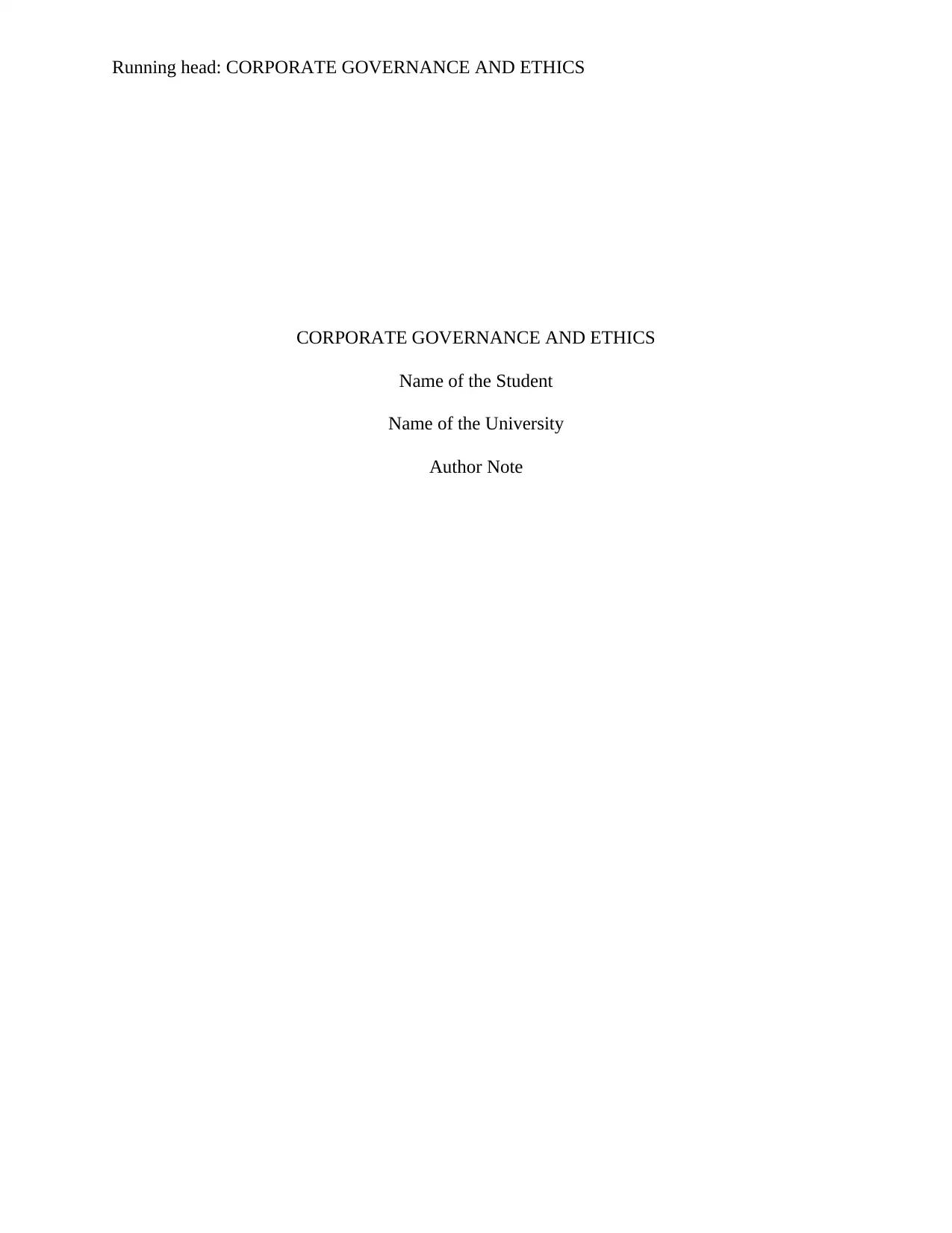
Running head: CORPORATE GOVERNANCE AND ETHICS
CORPORATE GOVERNANCE AND ETHICS
Name of the Student
Name of the University
Author Note
CORPORATE GOVERNANCE AND ETHICS
Name of the Student
Name of the University
Author Note
Paraphrase This Document
Need a fresh take? Get an instant paraphrase of this document with our AI Paraphraser
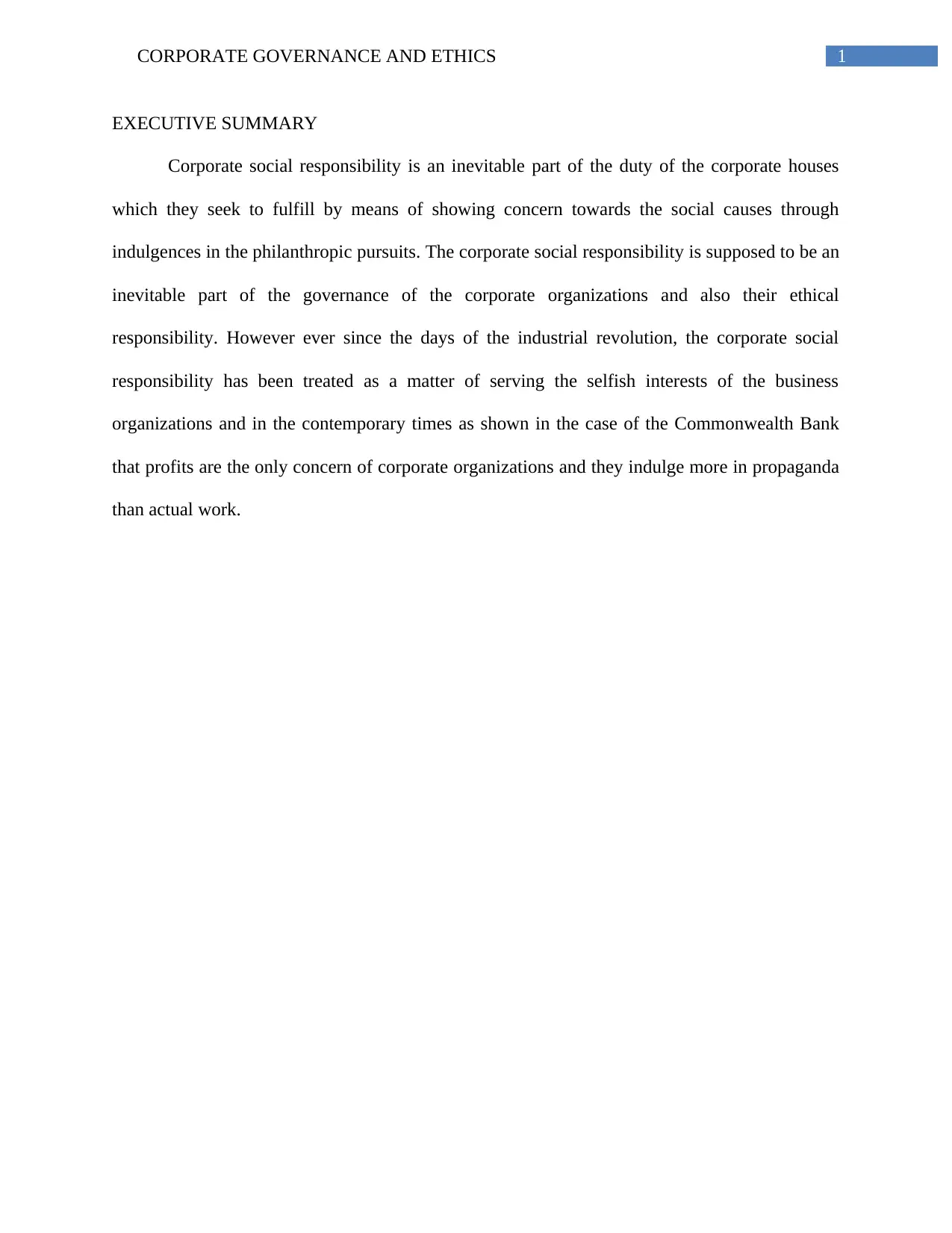
1CORPORATE GOVERNANCE AND ETHICS
EXECUTIVE SUMMARY
Corporate social responsibility is an inevitable part of the duty of the corporate houses
which they seek to fulfill by means of showing concern towards the social causes through
indulgences in the philanthropic pursuits. The corporate social responsibility is supposed to be an
inevitable part of the governance of the corporate organizations and also their ethical
responsibility. However ever since the days of the industrial revolution, the corporate social
responsibility has been treated as a matter of serving the selfish interests of the business
organizations and in the contemporary times as shown in the case of the Commonwealth Bank
that profits are the only concern of corporate organizations and they indulge more in propaganda
than actual work.
EXECUTIVE SUMMARY
Corporate social responsibility is an inevitable part of the duty of the corporate houses
which they seek to fulfill by means of showing concern towards the social causes through
indulgences in the philanthropic pursuits. The corporate social responsibility is supposed to be an
inevitable part of the governance of the corporate organizations and also their ethical
responsibility. However ever since the days of the industrial revolution, the corporate social
responsibility has been treated as a matter of serving the selfish interests of the business
organizations and in the contemporary times as shown in the case of the Commonwealth Bank
that profits are the only concern of corporate organizations and they indulge more in propaganda
than actual work.
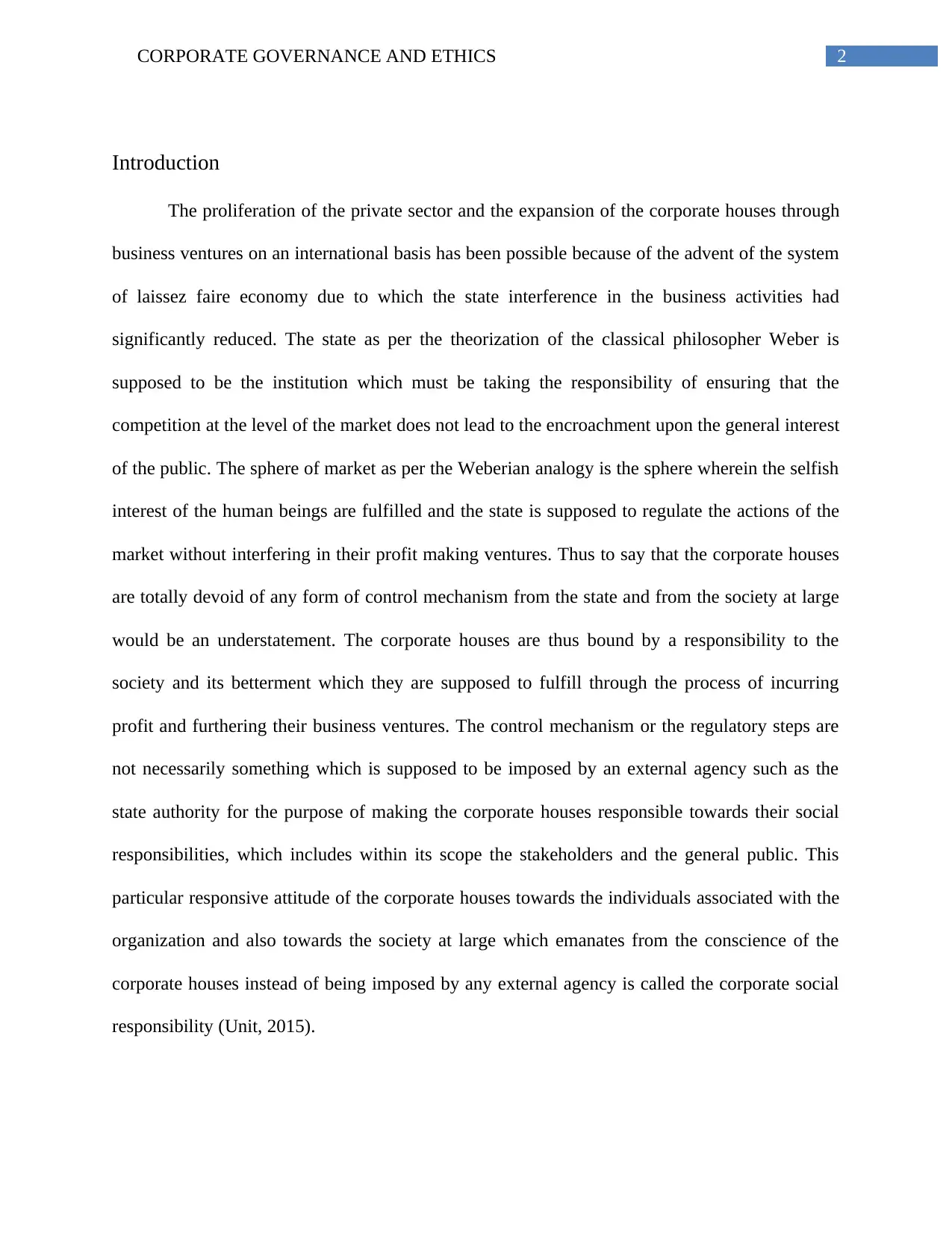
2CORPORATE GOVERNANCE AND ETHICS
Introduction
The proliferation of the private sector and the expansion of the corporate houses through
business ventures on an international basis has been possible because of the advent of the system
of laissez faire economy due to which the state interference in the business activities had
significantly reduced. The state as per the theorization of the classical philosopher Weber is
supposed to be the institution which must be taking the responsibility of ensuring that the
competition at the level of the market does not lead to the encroachment upon the general interest
of the public. The sphere of market as per the Weberian analogy is the sphere wherein the selfish
interest of the human beings are fulfilled and the state is supposed to regulate the actions of the
market without interfering in their profit making ventures. Thus to say that the corporate houses
are totally devoid of any form of control mechanism from the state and from the society at large
would be an understatement. The corporate houses are thus bound by a responsibility to the
society and its betterment which they are supposed to fulfill through the process of incurring
profit and furthering their business ventures. The control mechanism or the regulatory steps are
not necessarily something which is supposed to be imposed by an external agency such as the
state authority for the purpose of making the corporate houses responsible towards their social
responsibilities, which includes within its scope the stakeholders and the general public. This
particular responsive attitude of the corporate houses towards the individuals associated with the
organization and also towards the society at large which emanates from the conscience of the
corporate houses instead of being imposed by any external agency is called the corporate social
responsibility (Unit, 2015).
Introduction
The proliferation of the private sector and the expansion of the corporate houses through
business ventures on an international basis has been possible because of the advent of the system
of laissez faire economy due to which the state interference in the business activities had
significantly reduced. The state as per the theorization of the classical philosopher Weber is
supposed to be the institution which must be taking the responsibility of ensuring that the
competition at the level of the market does not lead to the encroachment upon the general interest
of the public. The sphere of market as per the Weberian analogy is the sphere wherein the selfish
interest of the human beings are fulfilled and the state is supposed to regulate the actions of the
market without interfering in their profit making ventures. Thus to say that the corporate houses
are totally devoid of any form of control mechanism from the state and from the society at large
would be an understatement. The corporate houses are thus bound by a responsibility to the
society and its betterment which they are supposed to fulfill through the process of incurring
profit and furthering their business ventures. The control mechanism or the regulatory steps are
not necessarily something which is supposed to be imposed by an external agency such as the
state authority for the purpose of making the corporate houses responsible towards their social
responsibilities, which includes within its scope the stakeholders and the general public. This
particular responsive attitude of the corporate houses towards the individuals associated with the
organization and also towards the society at large which emanates from the conscience of the
corporate houses instead of being imposed by any external agency is called the corporate social
responsibility (Unit, 2015).
⊘ This is a preview!⊘
Do you want full access?
Subscribe today to unlock all pages.

Trusted by 1+ million students worldwide
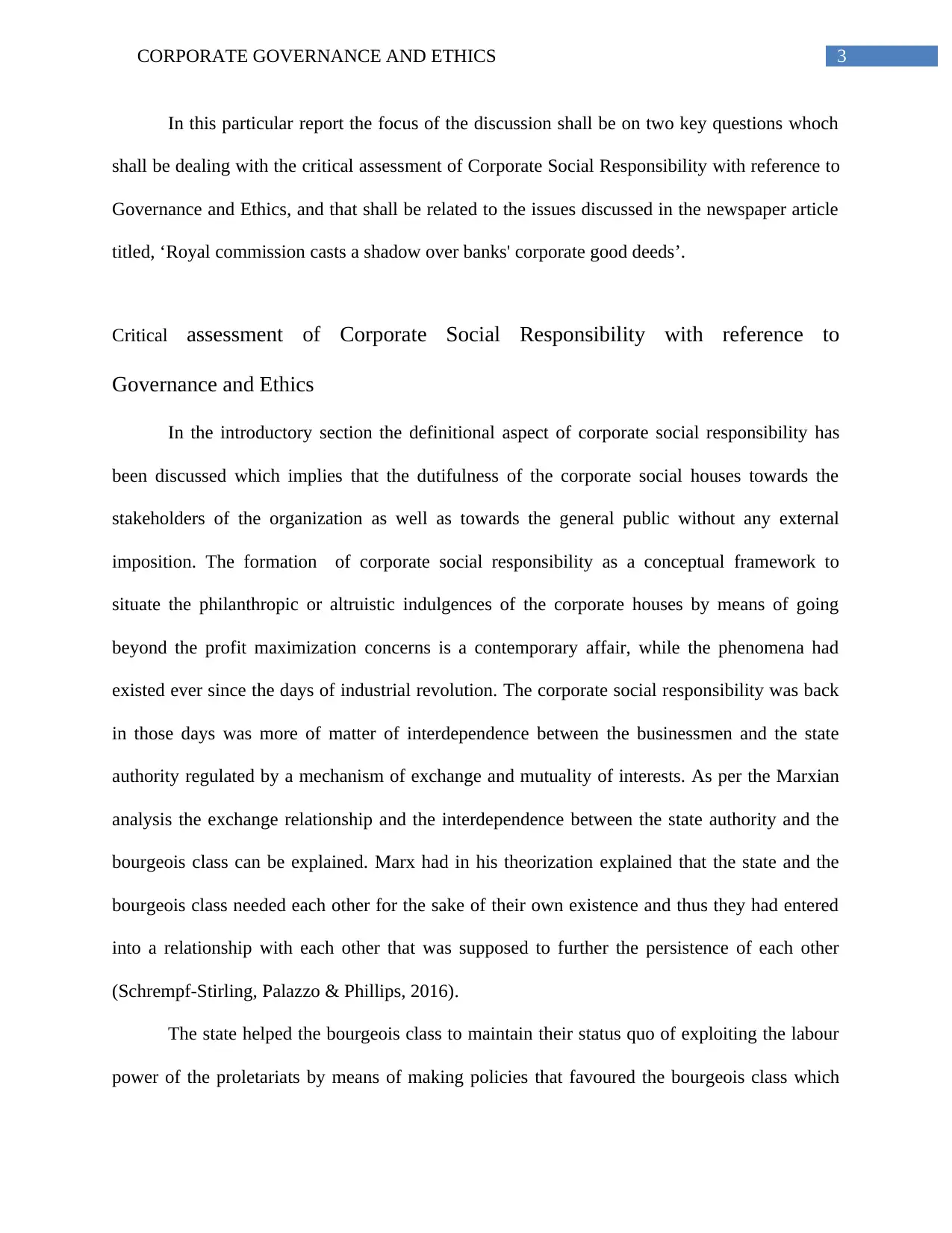
3CORPORATE GOVERNANCE AND ETHICS
In this particular report the focus of the discussion shall be on two key questions whoch
shall be dealing with the critical assessment of Corporate Social Responsibility with reference to
Governance and Ethics, and that shall be related to the issues discussed in the newspaper article
titled, ‘Royal commission casts a shadow over banks' corporate good deeds’.
Critical assessment of Corporate Social Responsibility with reference to
Governance and Ethics
In the introductory section the definitional aspect of corporate social responsibility has
been discussed which implies that the dutifulness of the corporate social houses towards the
stakeholders of the organization as well as towards the general public without any external
imposition. The formation of corporate social responsibility as a conceptual framework to
situate the philanthropic or altruistic indulgences of the corporate houses by means of going
beyond the profit maximization concerns is a contemporary affair, while the phenomena had
existed ever since the days of industrial revolution. The corporate social responsibility was back
in those days was more of matter of interdependence between the businessmen and the state
authority regulated by a mechanism of exchange and mutuality of interests. As per the Marxian
analysis the exchange relationship and the interdependence between the state authority and the
bourgeois class can be explained. Marx had in his theorization explained that the state and the
bourgeois class needed each other for the sake of their own existence and thus they had entered
into a relationship with each other that was supposed to further the persistence of each other
(Schrempf-Stirling, Palazzo & Phillips, 2016).
The state helped the bourgeois class to maintain their status quo of exploiting the labour
power of the proletariats by means of making policies that favoured the bourgeois class which
In this particular report the focus of the discussion shall be on two key questions whoch
shall be dealing with the critical assessment of Corporate Social Responsibility with reference to
Governance and Ethics, and that shall be related to the issues discussed in the newspaper article
titled, ‘Royal commission casts a shadow over banks' corporate good deeds’.
Critical assessment of Corporate Social Responsibility with reference to
Governance and Ethics
In the introductory section the definitional aspect of corporate social responsibility has
been discussed which implies that the dutifulness of the corporate social houses towards the
stakeholders of the organization as well as towards the general public without any external
imposition. The formation of corporate social responsibility as a conceptual framework to
situate the philanthropic or altruistic indulgences of the corporate houses by means of going
beyond the profit maximization concerns is a contemporary affair, while the phenomena had
existed ever since the days of industrial revolution. The corporate social responsibility was back
in those days was more of matter of interdependence between the businessmen and the state
authority regulated by a mechanism of exchange and mutuality of interests. As per the Marxian
analysis the exchange relationship and the interdependence between the state authority and the
bourgeois class can be explained. Marx had in his theorization explained that the state and the
bourgeois class needed each other for the sake of their own existence and thus they had entered
into a relationship with each other that was supposed to further the persistence of each other
(Schrempf-Stirling, Palazzo & Phillips, 2016).
The state helped the bourgeois class to maintain their status quo of exploiting the labour
power of the proletariats by means of making policies that favoured the bourgeois class which
Paraphrase This Document
Need a fresh take? Get an instant paraphrase of this document with our AI Paraphraser
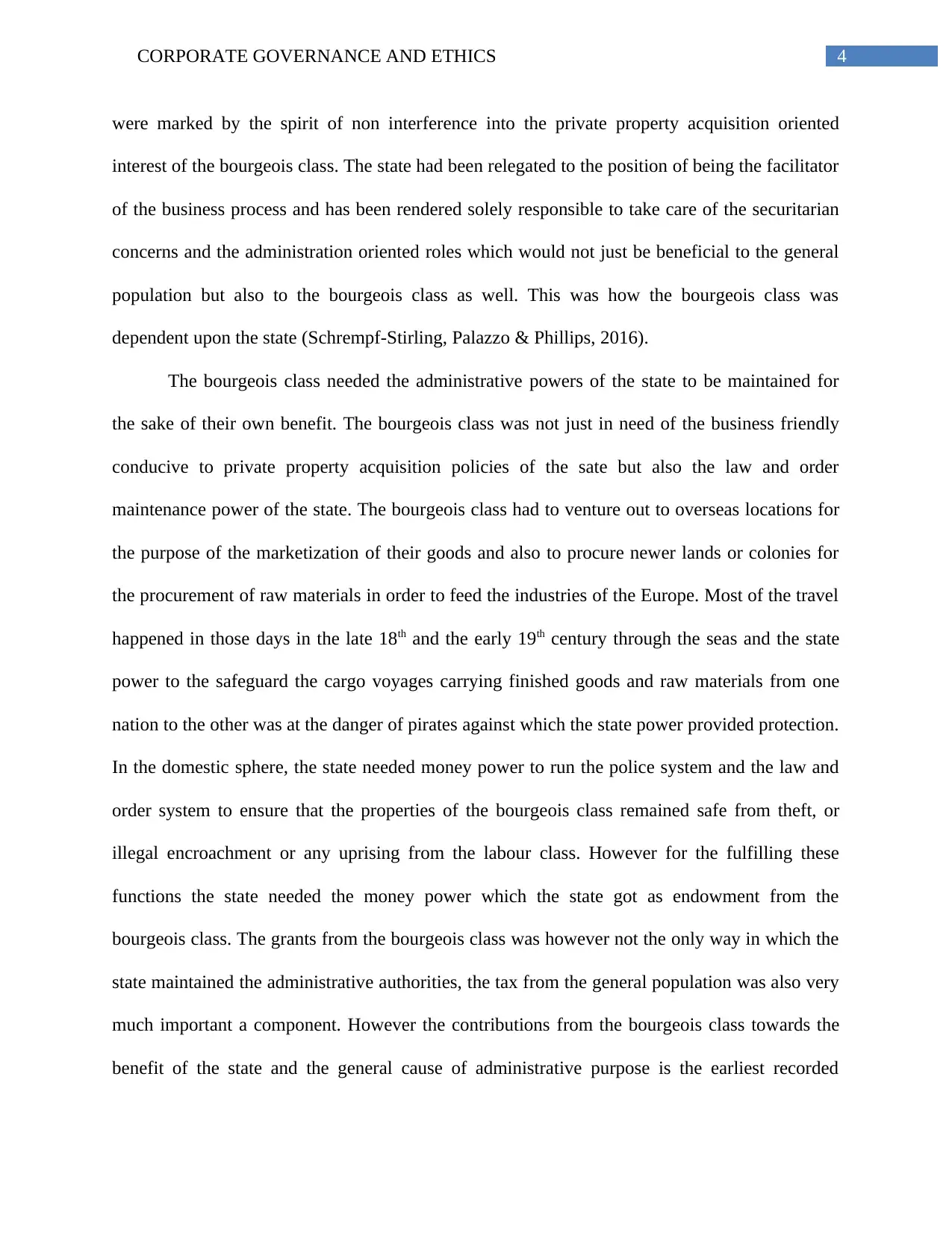
4CORPORATE GOVERNANCE AND ETHICS
were marked by the spirit of non interference into the private property acquisition oriented
interest of the bourgeois class. The state had been relegated to the position of being the facilitator
of the business process and has been rendered solely responsible to take care of the securitarian
concerns and the administration oriented roles which would not just be beneficial to the general
population but also to the bourgeois class as well. This was how the bourgeois class was
dependent upon the state (Schrempf-Stirling, Palazzo & Phillips, 2016).
The bourgeois class needed the administrative powers of the state to be maintained for
the sake of their own benefit. The bourgeois class was not just in need of the business friendly
conducive to private property acquisition policies of the sate but also the law and order
maintenance power of the state. The bourgeois class had to venture out to overseas locations for
the purpose of the marketization of their goods and also to procure newer lands or colonies for
the procurement of raw materials in order to feed the industries of the Europe. Most of the travel
happened in those days in the late 18th and the early 19th century through the seas and the state
power to the safeguard the cargo voyages carrying finished goods and raw materials from one
nation to the other was at the danger of pirates against which the state power provided protection.
In the domestic sphere, the state needed money power to run the police system and the law and
order system to ensure that the properties of the bourgeois class remained safe from theft, or
illegal encroachment or any uprising from the labour class. However for the fulfilling these
functions the state needed the money power which the state got as endowment from the
bourgeois class. The grants from the bourgeois class was however not the only way in which the
state maintained the administrative authorities, the tax from the general population was also very
much important a component. However the contributions from the bourgeois class towards the
benefit of the state and the general cause of administrative purpose is the earliest recorded
were marked by the spirit of non interference into the private property acquisition oriented
interest of the bourgeois class. The state had been relegated to the position of being the facilitator
of the business process and has been rendered solely responsible to take care of the securitarian
concerns and the administration oriented roles which would not just be beneficial to the general
population but also to the bourgeois class as well. This was how the bourgeois class was
dependent upon the state (Schrempf-Stirling, Palazzo & Phillips, 2016).
The bourgeois class needed the administrative powers of the state to be maintained for
the sake of their own benefit. The bourgeois class was not just in need of the business friendly
conducive to private property acquisition policies of the sate but also the law and order
maintenance power of the state. The bourgeois class had to venture out to overseas locations for
the purpose of the marketization of their goods and also to procure newer lands or colonies for
the procurement of raw materials in order to feed the industries of the Europe. Most of the travel
happened in those days in the late 18th and the early 19th century through the seas and the state
power to the safeguard the cargo voyages carrying finished goods and raw materials from one
nation to the other was at the danger of pirates against which the state power provided protection.
In the domestic sphere, the state needed money power to run the police system and the law and
order system to ensure that the properties of the bourgeois class remained safe from theft, or
illegal encroachment or any uprising from the labour class. However for the fulfilling these
functions the state needed the money power which the state got as endowment from the
bourgeois class. The grants from the bourgeois class was however not the only way in which the
state maintained the administrative authorities, the tax from the general population was also very
much important a component. However the contributions from the bourgeois class towards the
benefit of the state and the general cause of administrative purpose is the earliest recorded
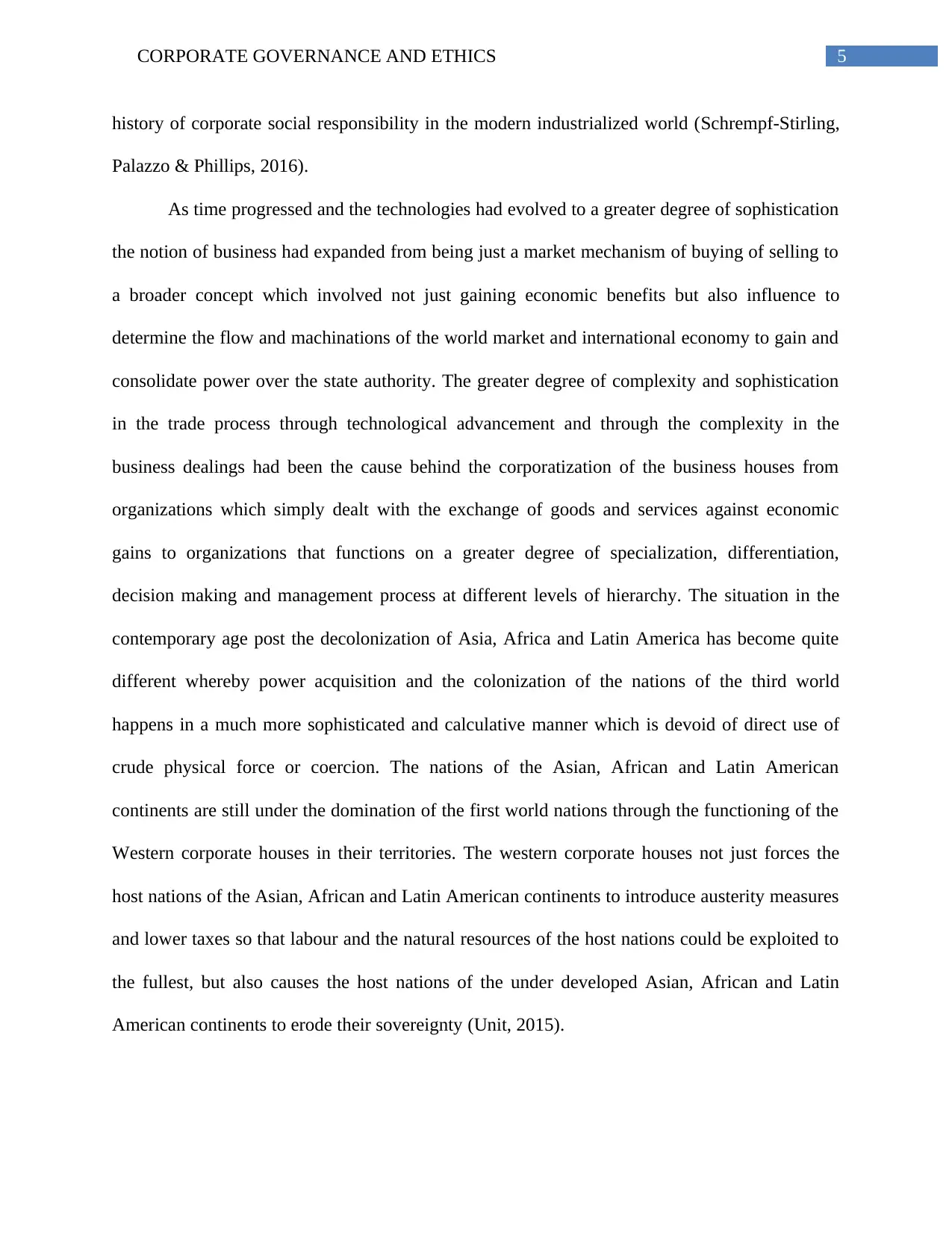
5CORPORATE GOVERNANCE AND ETHICS
history of corporate social responsibility in the modern industrialized world (Schrempf-Stirling,
Palazzo & Phillips, 2016).
As time progressed and the technologies had evolved to a greater degree of sophistication
the notion of business had expanded from being just a market mechanism of buying of selling to
a broader concept which involved not just gaining economic benefits but also influence to
determine the flow and machinations of the world market and international economy to gain and
consolidate power over the state authority. The greater degree of complexity and sophistication
in the trade process through technological advancement and through the complexity in the
business dealings had been the cause behind the corporatization of the business houses from
organizations which simply dealt with the exchange of goods and services against economic
gains to organizations that functions on a greater degree of specialization, differentiation,
decision making and management process at different levels of hierarchy. The situation in the
contemporary age post the decolonization of Asia, Africa and Latin America has become quite
different whereby power acquisition and the colonization of the nations of the third world
happens in a much more sophisticated and calculative manner which is devoid of direct use of
crude physical force or coercion. The nations of the Asian, African and Latin American
continents are still under the domination of the first world nations through the functioning of the
Western corporate houses in their territories. The western corporate houses not just forces the
host nations of the Asian, African and Latin American continents to introduce austerity measures
and lower taxes so that labour and the natural resources of the host nations could be exploited to
the fullest, but also causes the host nations of the under developed Asian, African and Latin
American continents to erode their sovereignty (Unit, 2015).
history of corporate social responsibility in the modern industrialized world (Schrempf-Stirling,
Palazzo & Phillips, 2016).
As time progressed and the technologies had evolved to a greater degree of sophistication
the notion of business had expanded from being just a market mechanism of buying of selling to
a broader concept which involved not just gaining economic benefits but also influence to
determine the flow and machinations of the world market and international economy to gain and
consolidate power over the state authority. The greater degree of complexity and sophistication
in the trade process through technological advancement and through the complexity in the
business dealings had been the cause behind the corporatization of the business houses from
organizations which simply dealt with the exchange of goods and services against economic
gains to organizations that functions on a greater degree of specialization, differentiation,
decision making and management process at different levels of hierarchy. The situation in the
contemporary age post the decolonization of Asia, Africa and Latin America has become quite
different whereby power acquisition and the colonization of the nations of the third world
happens in a much more sophisticated and calculative manner which is devoid of direct use of
crude physical force or coercion. The nations of the Asian, African and Latin American
continents are still under the domination of the first world nations through the functioning of the
Western corporate houses in their territories. The western corporate houses not just forces the
host nations of the Asian, African and Latin American continents to introduce austerity measures
and lower taxes so that labour and the natural resources of the host nations could be exploited to
the fullest, but also causes the host nations of the under developed Asian, African and Latin
American continents to erode their sovereignty (Unit, 2015).
⊘ This is a preview!⊘
Do you want full access?
Subscribe today to unlock all pages.

Trusted by 1+ million students worldwide
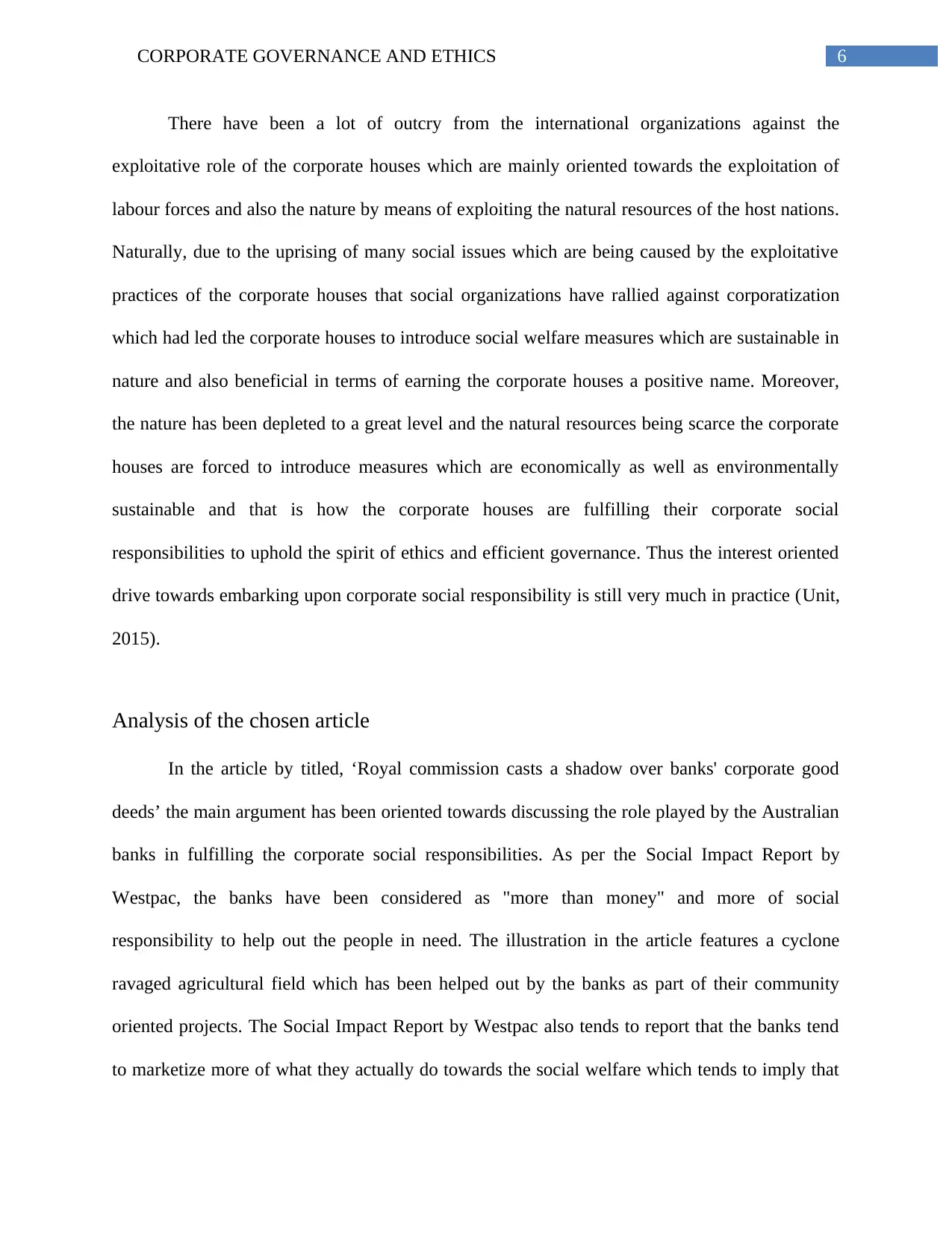
6CORPORATE GOVERNANCE AND ETHICS
There have been a lot of outcry from the international organizations against the
exploitative role of the corporate houses which are mainly oriented towards the exploitation of
labour forces and also the nature by means of exploiting the natural resources of the host nations.
Naturally, due to the uprising of many social issues which are being caused by the exploitative
practices of the corporate houses that social organizations have rallied against corporatization
which had led the corporate houses to introduce social welfare measures which are sustainable in
nature and also beneficial in terms of earning the corporate houses a positive name. Moreover,
the nature has been depleted to a great level and the natural resources being scarce the corporate
houses are forced to introduce measures which are economically as well as environmentally
sustainable and that is how the corporate houses are fulfilling their corporate social
responsibilities to uphold the spirit of ethics and efficient governance. Thus the interest oriented
drive towards embarking upon corporate social responsibility is still very much in practice (Unit,
2015).
Analysis of the chosen article
In the article by titled, ‘Royal commission casts a shadow over banks' corporate good
deeds’ the main argument has been oriented towards discussing the role played by the Australian
banks in fulfilling the corporate social responsibilities. As per the Social Impact Report by
Westpac, the banks have been considered as "more than money" and more of social
responsibility to help out the people in need. The illustration in the article features a cyclone
ravaged agricultural field which has been helped out by the banks as part of their community
oriented projects. The Social Impact Report by Westpac also tends to report that the banks tend
to marketize more of what they actually do towards the social welfare which tends to imply that
There have been a lot of outcry from the international organizations against the
exploitative role of the corporate houses which are mainly oriented towards the exploitation of
labour forces and also the nature by means of exploiting the natural resources of the host nations.
Naturally, due to the uprising of many social issues which are being caused by the exploitative
practices of the corporate houses that social organizations have rallied against corporatization
which had led the corporate houses to introduce social welfare measures which are sustainable in
nature and also beneficial in terms of earning the corporate houses a positive name. Moreover,
the nature has been depleted to a great level and the natural resources being scarce the corporate
houses are forced to introduce measures which are economically as well as environmentally
sustainable and that is how the corporate houses are fulfilling their corporate social
responsibilities to uphold the spirit of ethics and efficient governance. Thus the interest oriented
drive towards embarking upon corporate social responsibility is still very much in practice (Unit,
2015).
Analysis of the chosen article
In the article by titled, ‘Royal commission casts a shadow over banks' corporate good
deeds’ the main argument has been oriented towards discussing the role played by the Australian
banks in fulfilling the corporate social responsibilities. As per the Social Impact Report by
Westpac, the banks have been considered as "more than money" and more of social
responsibility to help out the people in need. The illustration in the article features a cyclone
ravaged agricultural field which has been helped out by the banks as part of their community
oriented projects. The Social Impact Report by Westpac also tends to report that the banks tend
to marketize more of what they actually do towards the social welfare which tends to imply that
Paraphrase This Document
Need a fresh take? Get an instant paraphrase of this document with our AI Paraphraser
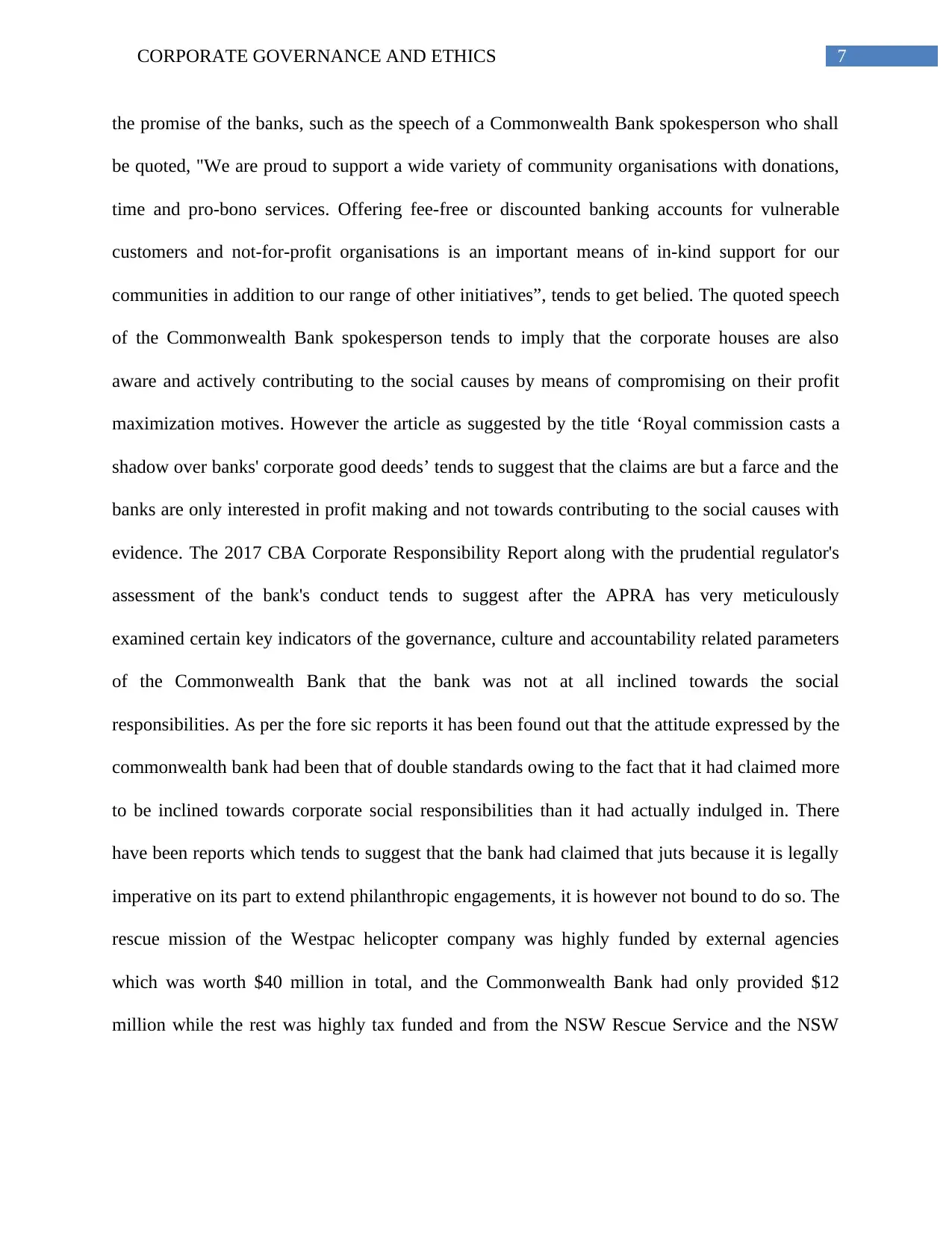
7CORPORATE GOVERNANCE AND ETHICS
the promise of the banks, such as the speech of a Commonwealth Bank spokesperson who shall
be quoted, "We are proud to support a wide variety of community organisations with donations,
time and pro-bono services. Offering fee-free or discounted banking accounts for vulnerable
customers and not-for-profit organisations is an important means of in-kind support for our
communities in addition to our range of other initiatives”, tends to get belied. The quoted speech
of the Commonwealth Bank spokesperson tends to imply that the corporate houses are also
aware and actively contributing to the social causes by means of compromising on their profit
maximization motives. However the article as suggested by the title ‘Royal commission casts a
shadow over banks' corporate good deeds’ tends to suggest that the claims are but a farce and the
banks are only interested in profit making and not towards contributing to the social causes with
evidence. The 2017 CBA Corporate Responsibility Report along with the prudential regulator's
assessment of the bank's conduct tends to suggest after the APRA has very meticulously
examined certain key indicators of the governance, culture and accountability related parameters
of the Commonwealth Bank that the bank was not at all inclined towards the social
responsibilities. As per the fore sic reports it has been found out that the attitude expressed by the
commonwealth bank had been that of double standards owing to the fact that it had claimed more
to be inclined towards corporate social responsibilities than it had actually indulged in. There
have been reports which tends to suggest that the bank had claimed that juts because it is legally
imperative on its part to extend philanthropic engagements, it is however not bound to do so. The
rescue mission of the Westpac helicopter company was highly funded by external agencies
which was worth $40 million in total, and the Commonwealth Bank had only provided $12
million while the rest was highly tax funded and from the NSW Rescue Service and the NSW
the promise of the banks, such as the speech of a Commonwealth Bank spokesperson who shall
be quoted, "We are proud to support a wide variety of community organisations with donations,
time and pro-bono services. Offering fee-free or discounted banking accounts for vulnerable
customers and not-for-profit organisations is an important means of in-kind support for our
communities in addition to our range of other initiatives”, tends to get belied. The quoted speech
of the Commonwealth Bank spokesperson tends to imply that the corporate houses are also
aware and actively contributing to the social causes by means of compromising on their profit
maximization motives. However the article as suggested by the title ‘Royal commission casts a
shadow over banks' corporate good deeds’ tends to suggest that the claims are but a farce and the
banks are only interested in profit making and not towards contributing to the social causes with
evidence. The 2017 CBA Corporate Responsibility Report along with the prudential regulator's
assessment of the bank's conduct tends to suggest after the APRA has very meticulously
examined certain key indicators of the governance, culture and accountability related parameters
of the Commonwealth Bank that the bank was not at all inclined towards the social
responsibilities. As per the fore sic reports it has been found out that the attitude expressed by the
commonwealth bank had been that of double standards owing to the fact that it had claimed more
to be inclined towards corporate social responsibilities than it had actually indulged in. There
have been reports which tends to suggest that the bank had claimed that juts because it is legally
imperative on its part to extend philanthropic engagements, it is however not bound to do so. The
rescue mission of the Westpac helicopter company was highly funded by external agencies
which was worth $40 million in total, and the Commonwealth Bank had only provided $12
million while the rest was highly tax funded and from the NSW Rescue Service and the NSW
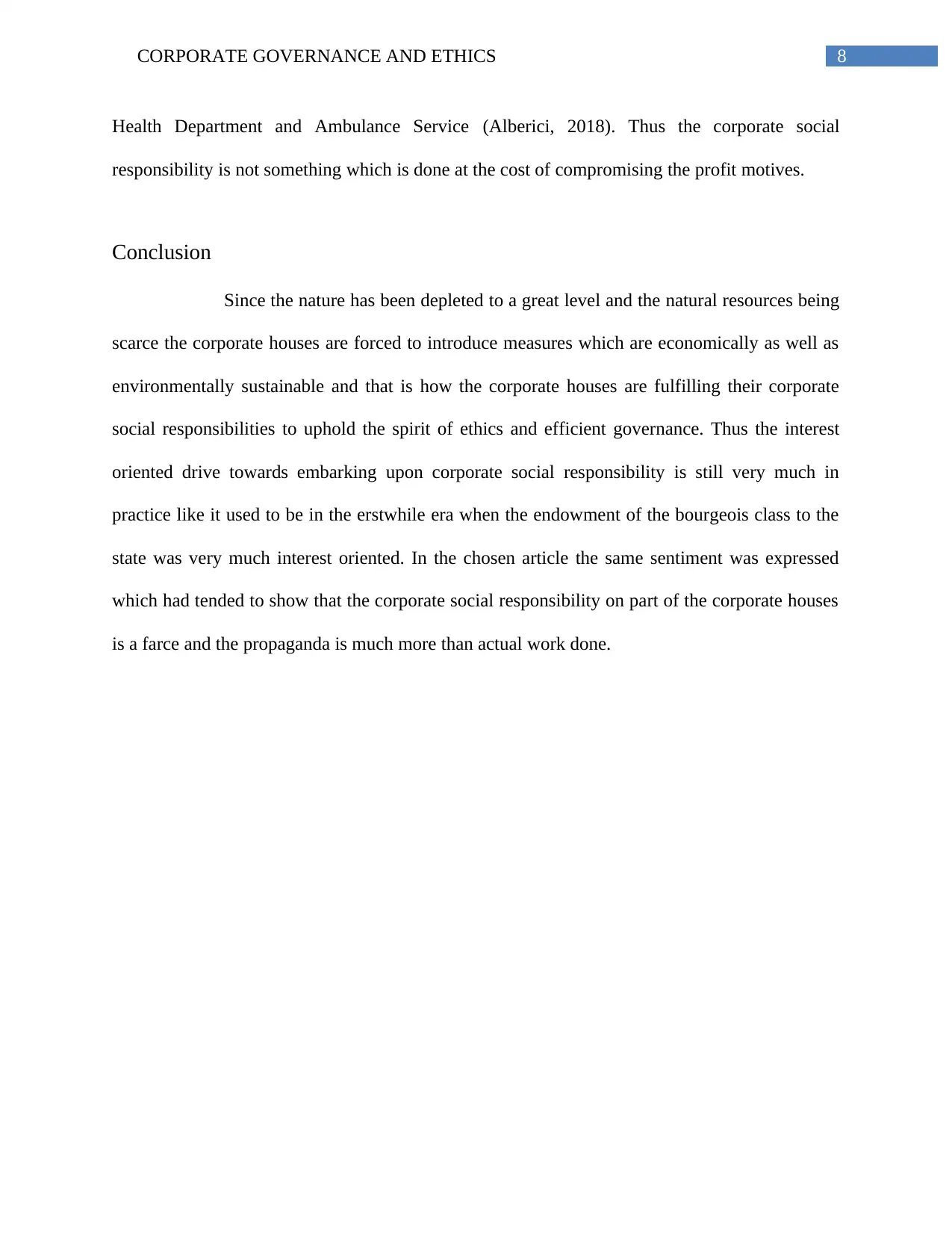
8CORPORATE GOVERNANCE AND ETHICS
Health Department and Ambulance Service (Alberici, 2018). Thus the corporate social
responsibility is not something which is done at the cost of compromising the profit motives.
Conclusion
Since the nature has been depleted to a great level and the natural resources being
scarce the corporate houses are forced to introduce measures which are economically as well as
environmentally sustainable and that is how the corporate houses are fulfilling their corporate
social responsibilities to uphold the spirit of ethics and efficient governance. Thus the interest
oriented drive towards embarking upon corporate social responsibility is still very much in
practice like it used to be in the erstwhile era when the endowment of the bourgeois class to the
state was very much interest oriented. In the chosen article the same sentiment was expressed
which had tended to show that the corporate social responsibility on part of the corporate houses
is a farce and the propaganda is much more than actual work done.
Health Department and Ambulance Service (Alberici, 2018). Thus the corporate social
responsibility is not something which is done at the cost of compromising the profit motives.
Conclusion
Since the nature has been depleted to a great level and the natural resources being
scarce the corporate houses are forced to introduce measures which are economically as well as
environmentally sustainable and that is how the corporate houses are fulfilling their corporate
social responsibilities to uphold the spirit of ethics and efficient governance. Thus the interest
oriented drive towards embarking upon corporate social responsibility is still very much in
practice like it used to be in the erstwhile era when the endowment of the bourgeois class to the
state was very much interest oriented. In the chosen article the same sentiment was expressed
which had tended to show that the corporate social responsibility on part of the corporate houses
is a farce and the propaganda is much more than actual work done.
⊘ This is a preview!⊘
Do you want full access?
Subscribe today to unlock all pages.

Trusted by 1+ million students worldwide
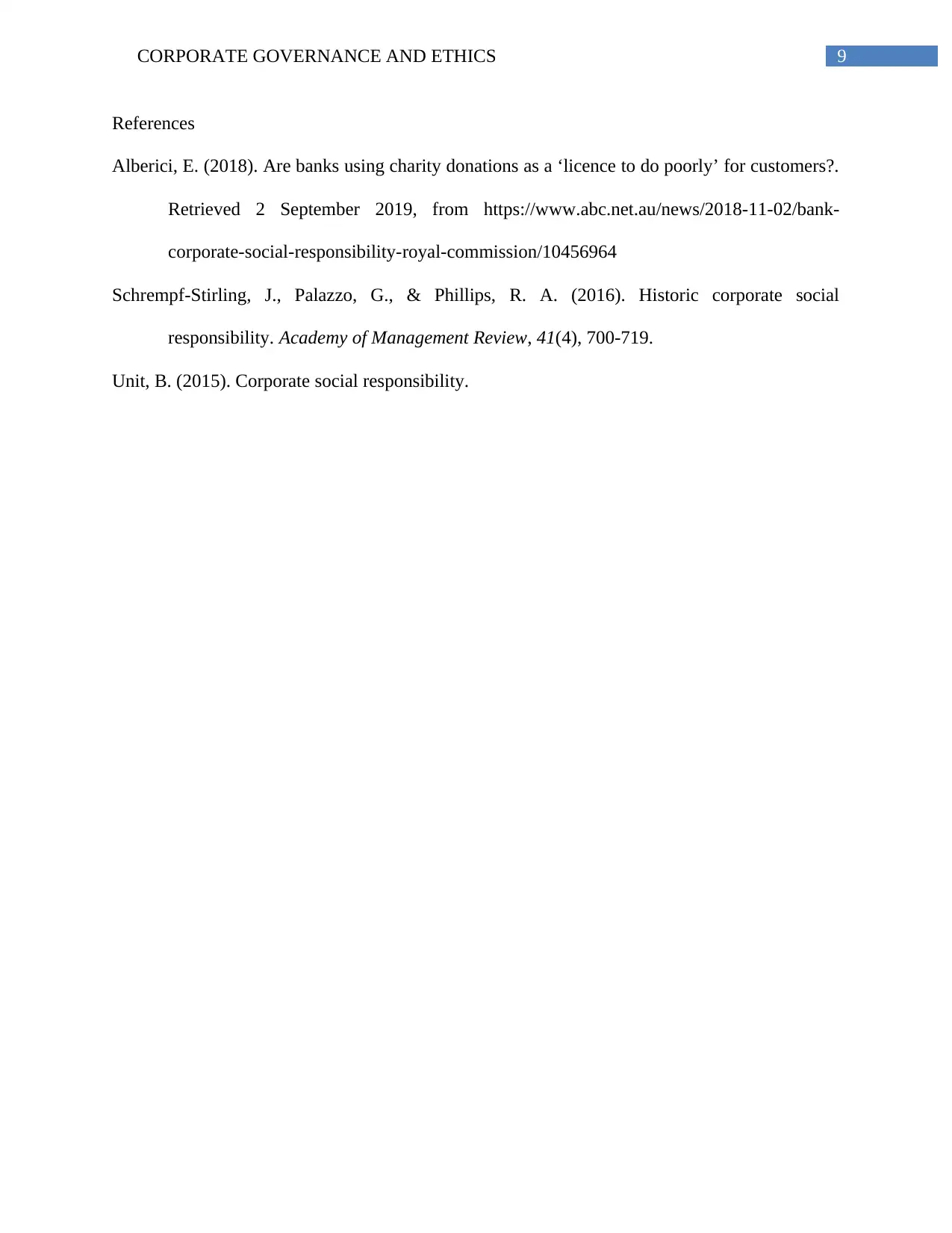
9CORPORATE GOVERNANCE AND ETHICS
References
Alberici, E. (2018). Are banks using charity donations as a ‘licence to do poorly’ for customers?.
Retrieved 2 September 2019, from https://www.abc.net.au/news/2018-11-02/bank-
corporate-social-responsibility-royal-commission/10456964
Schrempf-Stirling, J., Palazzo, G., & Phillips, R. A. (2016). Historic corporate social
responsibility. Academy of Management Review, 41(4), 700-719.
Unit, B. (2015). Corporate social responsibility.
References
Alberici, E. (2018). Are banks using charity donations as a ‘licence to do poorly’ for customers?.
Retrieved 2 September 2019, from https://www.abc.net.au/news/2018-11-02/bank-
corporate-social-responsibility-royal-commission/10456964
Schrempf-Stirling, J., Palazzo, G., & Phillips, R. A. (2016). Historic corporate social
responsibility. Academy of Management Review, 41(4), 700-719.
Unit, B. (2015). Corporate social responsibility.
1 out of 10
Related Documents
Your All-in-One AI-Powered Toolkit for Academic Success.
+13062052269
info@desklib.com
Available 24*7 on WhatsApp / Email
![[object Object]](/_next/static/media/star-bottom.7253800d.svg)
Unlock your academic potential
Copyright © 2020–2025 A2Z Services. All Rights Reserved. Developed and managed by ZUCOL.



